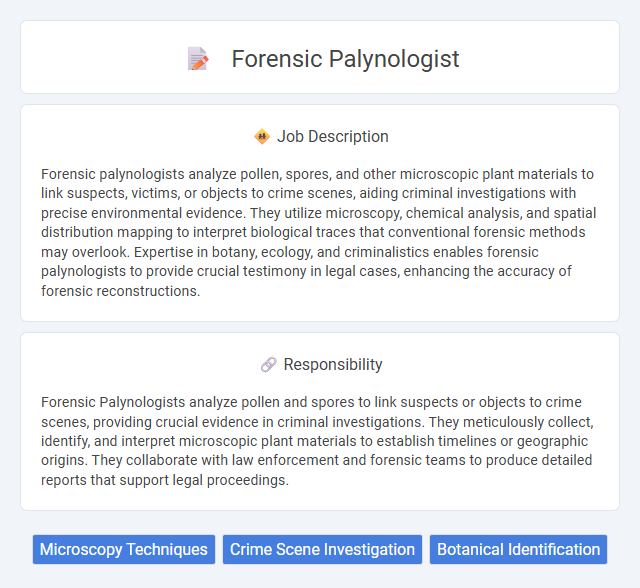
Forensic palynologists analyze pollen, spores, and other microscopic plant materials to link suspects, victims, or objects to crime scenes, aiding criminal investigations with precise environmental evidence. They utilize microscopy, chemical analysis, and spatial distribution mapping to interpret biological traces that conventional forensic methods may overlook. Expertise in botany, ecology, and criminalistics enables forensic palynologists to provide crucial testimony in legal cases, enhancing the accuracy of forensic reconstructions.
Individuals with strong attention to detail and a passion for biology or environmental science are likely suitable for a career as a forensic palynologist. Those who prefer solitary, meticulous work over fast-paced, interpersonal environments probably find this job rewarding. Candidates with patience and the ability to analyze microscopic evidence under pressure may have a higher probability of succeeding in this specialized forensic field.
Qualification
Forensic palynologists require a strong background in botany, ecology, or geology, typically holding a bachelor's or master's degree in these fields with specialized training in palynology. Advanced qualifications often include a PhD focusing on pollen analysis and its applications in forensic science, alongside proficiency in microscopy and chemical analysis techniques. Practical experience in crime scene investigation and familiarity with legal procedures enhance a forensic palynologist's ability to provide accurate, court-admissible evidence.
Responsibility
Forensic Palynologists analyze pollen and spores to link suspects or objects to crime scenes, providing crucial evidence in criminal investigations. They meticulously collect, identify, and interpret microscopic plant materials to establish timelines or geographic origins. They collaborate with law enforcement and forensic teams to produce detailed reports that support legal proceedings.
Benefit
Forensic palynologists likely provide critical insights in criminal investigations by analyzing pollen and spores found at crime scenes, enhancing the probability of linking suspects to specific locations. Their expertise may aid in reconstructing crime events and timelines, increasing the chances of accurate case resolutions. Employing this specialized knowledge could improve evidence reliability, benefiting law enforcement and judicial processes.
Challenge
Forensic palynologists likely face the challenge of accurately interpreting pollen evidence from complex crime scenes where contamination or environmental factors may obscure results. The probability of encountering limited or degraded samples can complicate the reconstruction of events or locations relevant to investigations. Skillful analysis and careful consideration of context are essential to overcome these obstacles and provide reliable forensic insights.
Career Advancement
Forensic Palynologists leverage their expertise in pollen and spore analysis to support criminal investigations and environmental forensics, with opportunities for career advancement through specialization in high-demand sectors such as crime scene analysis and climate impact studies. Progression often involves obtaining advanced degrees or certifications in palynology, forensic science, or related fields, while contributing to peer-reviewed research and expanding interdisciplinary collaboration. Leadership roles in forensic laboratories or academic institutions become attainable as professionals demonstrate technical proficiency, publish influential findings, and engage in training the next generation of forensic specialists.
Key Terms
Microscopy Techniques
Forensic palynologists utilize advanced microscopy techniques such as light microscopy and scanning electron microscopy (SEM) to analyze pollen and spore samples in criminal investigations. These microscopy methods enable the identification of microscopic botanical evidence with high precision, aiding in crime scene reconstruction and linking suspects or objects to specific locations. Expertise in sample preparation, imaging, and morphological analysis ensures accurate interpretation of microscopic evidence critical in forensic casework.
Crime Scene Investigation
Forensic palynologists analyze pollen, spores, and other microscopic plant materials found at crime scenes to link suspects, victims, and locations. Their expertise in microscopic botanical evidence helps establish timelines, trace movement, and confirm geographical connections critical to criminal investigations. They collaborate closely with law enforcement and forensic teams to provide scientifically validated evidence supporting crime scene reconstruction.
Botanical Identification
Forensic palynologists specialize in botanical identification by analyzing pollen, spores, and other microscopic plant materials to link suspects, victims, and crime scenes. Their expertise in plant taxonomy, morphology, and distribution patterns provides crucial evidence in criminal investigations, establishing timelines and geographical origins. Precision in microscopic examination and database comparison enhances the reliability of botanical evidence in legal proceedings.
 kuljobs.com
kuljobs.com